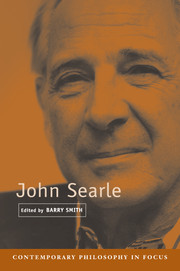Book contents
- Frontmatter
- Contents
- List of Contributors
- 1 John Searle: From Speech Acts to Social Reality
- 2 From Speech Acts to Speech Activity
- 3 Intentions, Promises, and Obligations
- 4 Law
- 5 Action
- 6 Consciousness
- 7 The Intentionality of Perception
- 8 Sense Data
- 9 The Limits of Expressibility
- 10 The Chinese Room Argument
- 11 Searle, Derrida, and the Ends of Phenomenology
- Further Reading
- Index
6 - Consciousness
Published online by Cambridge University Press: 05 June 2012
- Frontmatter
- Contents
- List of Contributors
- 1 John Searle: From Speech Acts to Social Reality
- 2 From Speech Acts to Speech Activity
- 3 Intentions, Promises, and Obligations
- 4 Law
- 5 Action
- 6 Consciousness
- 7 The Intentionality of Perception
- 8 Sense Data
- 9 The Limits of Expressibility
- 10 The Chinese Room Argument
- 11 Searle, Derrida, and the Ends of Phenomenology
- Further Reading
- Index
Summary
THE IMPORTANCE OF BEING CONSCIOUS
Consciousness is central to John Searle's philosophy of mind. He holds that ‘the primary and most essential feature of minds is consciousness’, and that ‘we really have no notion of the mental apart from our notion of consciousness’. Not only is consciousness central to our conception of mind, but Searle insists that ‘there is a sense in which it is the most important feature of reality, because all other things have value, importance, merit or worth only in relation to consciousness’. He maintains that ‘consciousness is the condition that makes it possible for anything at all to matter to anybody’. Searle argues that mind, meaning, and social reality depend upon consciousness. He has sought to develop a rich systematic account of how these various phenomena, all dependent upon consciousness, fit together. There is an order of dependence here. Social facts and linguistic meaning depend upon mind. Mind presupposes consciousness. Our concern here will be limited to mind and consciousness.
Searle takes consciousness to be a natural phenomenon, a feature of the natural world described and explained by the natural sciences. The two assumptions – that consciousness is central to mind and meaning, and that consciousness is a natural phenomenon – give rise to the traditional philosophical problem of consciousness: the problem of how we reconcile the subjective nature of consciousness with the objective nature of the world studied by the natural sciences. The problem of consciousness features in two distinctive ways in Searle's thought.
- Type
- Chapter
- Information
- John Searle , pp. 128 - 153Publisher: Cambridge University PressPrint publication year: 2003
- 3
- Cited by



